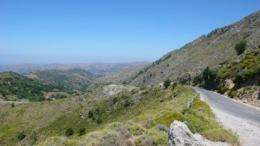Lions in Greece, the reforestation of the West and the use of satire in environmental conservation

As the Greek economy maintains its slide towards default and the global climate continues to change for the worse, one organisation, writing in Biotropica, has come up with some novel answers to both problems. Reforest the country to offset historic deforestation and reintroduce long extinct animals such as lions, boosting the economy through eco-tourism.
The Coalition of Financially Challenged Countries With Lots of Trees (CoFCCLoT) also count the introduction of wild gorillas to Spain and the return of forests in G8 nations back to pre-industrial levels, among its suggestions for global sustainability.
CoFCCLoT of course does not exist. However, argue Erik Meijaard and Douglas Sheil, from the University of Queensland and the Institute of Tropical Forest Conservation respectively, this fictitious organization's demands are an example of the effective use of satire to bridge seemingly impassable gaps in the understanding of politically contentious issues.
"Mockery is seldom part of the scientific approach, but it is effective when it comes to sustainability and the environment," said Meijaard. "Scientists tend to approach problems using objective logic and data, ignoring the emotional content and subjective values. Conservation science is especially vulnerable as it is about values as much as facts."

The use of satire to cut to the heart of a crisis has a noble history stretching back to 1729 and Jonathan Swifts Modest Proposal to consider cannibalism as an answer to the economic plight of the improvised Irish community. It is this tradition, Meijaard and Sheil argue, which should be embraced by climate and conservation communicators today.
In their Biotropica paper Meijaard and Sheil consider a range of issues to compare the demands 'the West' makes of the developing world and how this contrasts hypocritically with how western consumers and politicians view their own actions. For example it's perceived that 'the West' lambasts developing economies for focusing on cash crops, while remaining firmly attached to the resulting morning cup of coffee.

"An effective use of satire and humor can clarify the social, political or ethical obstacles to which conservation science is often blind," concluded Sheil. "These obstacles play a major role in the political impasse to combating problems such as climate change. Using satire to force a reader to consider an issue from a surprising new angle, even if that angle is ridiculous, can help bridge the gap in perspectives."
More information: This paper is available free online: doi.wiley.com/10.1111/j.1744-7429.2011.00802.x
Provided by Wiley















